The American National Catholic Church, founded in the Garden State almost a decade ago, mirrors Roman Catholicism but diverges on such issues as gay marriage and divorce.
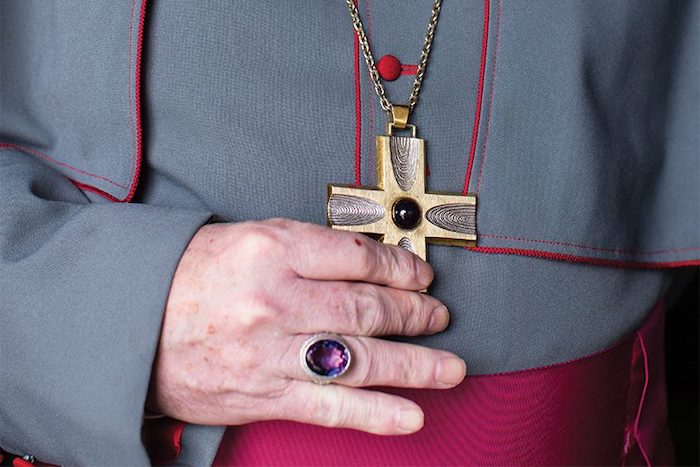
By Joe Strupp
Walk into St. Francis of Assisi Catholic Church in Glen Ridge on a Sunday morning and you’ll find the trappings and sacraments of a typical parish.
From the kneeling parishioners to the priests in robes dispensing Holy Communion, there are few signs of divergence from tradition.
There is, however, one stark, if less apparent, difference: The priest leading the service, the Rev. Geety Reyes, is openly gay.
St. Francis of Assisi and two kindred churches in Kearny and Long Branch, belong to the American National Catholic Church, an independent religious movement founded in the Garden State nearly 10 years ago. ANCC affilates mirror the Roman Catholic Church in most respects, except those elements that members find judgmental or discriminatory.
“We believe in an all-inclusive, loving God,” Reyes tells New Jersey Monthly. “We tend to be progressive, but we are conservative in that we embrace the Gospel.”
The ANCC also embraces numerous innovations the Vatican rejects, including gay, married and female priests, gay marriage and divorce. Transgender, nonbinary and gender-fluid members are also welcome. The ANCC also supports a reproductive choice.
“We don’t see ourselves as a new church,” says the Most Rev. George R. Lucey, pastor of St. Francis of Assisi. Lucey, who is also openly gay, was instrumental in founding the ANCC in Glen Ridge in 2009 and presides as bishop over all 10 ANCC parishes in seven states. “We see ourselves as united to the same church that was founded by Christ.”
Catholic Church officialdom begs to differ. Asked to comment on the ANCC and its place in Catholic faith, a spokesperson for the Archdiocese of Newark provided this statement: “It would be inappropriate for us to make any comment about the American National Catholic Church other than to state that this group is not in union with the Catholic Church in Rome, so they are not in union with the Holy Father. We will leave it at that.”
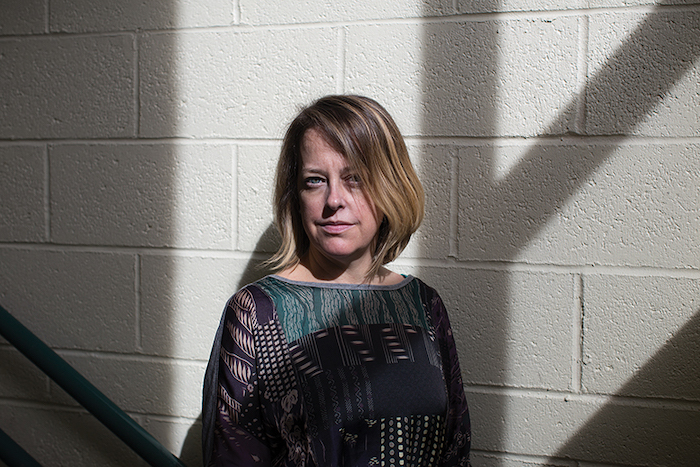
New parishioners come to the ANCC for a variety of reasons. “I was not happy with the way that the whole bad-priests scandal was handled,” says Loretta Marches, a five-year member of the ANCC parish in Glen Ridge, her hometown. “I have a strong Catholic faith, but many misgivings with the Catholic Church. I found the [ANCC] website and contacted them because it was exactly what I was looking for—none of the politics and the exclusion of certain people.”
The ANCC’s three New Jersey parishes have more than 1,500 members, up from 1,000 in 2016 and 500 in 2014, Lucey says. Nationwide, ANCC claims about 2,000 parishioners; Lucey expects new parishes in the coming months in Poughkeepsie, New York, and Baltimore, Maryland.
According to a 2018 Pew Research Center report, between 2007 and 2014, Catholicism nationwide saw a “greater net loss due to religious switching than has any other religious tradition in the U.S.” The report further states that 13 percent of all U.S. adults “are former Catholics,” a higher rate than any other religion. But the same report found that only 2 percent of U.S. adults are converts to Catholicism—that is, people who now identify as Catholic after being raised in another religion (or with no religion).
A native of the Philippines, Reyes joined the ANCC church as a parishioner. He was ordained as a deacon in 2012 and as a priest three years later.
“I was raised Roman Catholic; I wanted to follow it,” says Reyes, 43. Unfortunately, his gay identity made him feel uncomfortable in the Roman Catholic church. Then he learned about the ANCC.
“One of our taglines when we preach is that we are Catholics without judgment,” he says.
ANCC leaders estimate there are about 400 independent Catholic jurisdictions in the United States—all unaffiliated with Rome. ANCC appears to be the largest group among the Garden State’s Catholic alternatives. Others in New Jersey include Good Shepherd Reformed Catholic Church in Toms River, and the Saints Peter and Paul Polish National Catholic Church in Passaic.
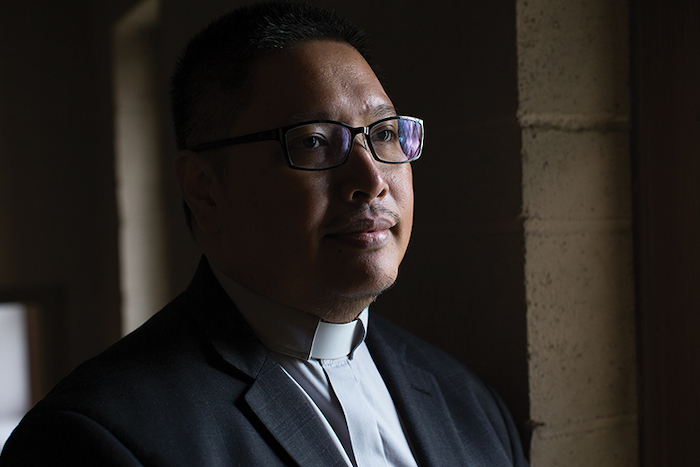
“We don’t exist as an axe to grind against Rome; we don’t really fight with anybody,” Lucey explains. “[Parishioners] come in and it’s a little like being home. There’s a great comfort in that. If people are attracted to us, it is because they see in the expression—which the Catholic Church has always taught, but has gotten away from—that God accepts and loves all of us for who we are.”
Reyes says that while many St. Francis of Assisi parishioners are gay, the parish has just as many traditional families with moms, dads and children. “It is becoming more and more mixed,” he says.
None of ANCC’s three New Jersey parishes has its own chapel. St. Francis of Assisi leases a small chapel behind the much larger Glen Ridge Congregational Church. Our Lady of Guadalupe American National Catholic Church, founded in 2011, borrows space in St. James Episcopal Church in Long Branch. The Sacred Heart of Jesus American National Catholic Church, launched in 2013, holds mass in Kearny’s Grace United Methodist Church.

That doesn’t seem to bother parishioners. “What is important to me is the lack of restrictions on how people find their spirituality. This church respects their right to worship,” says Hap Walter Bojsza, a West Orange resident who joined the Glen Ridge parish four years ago. “Our liturgies are the same Catholic liturgies, our readings are the same week after week. There are no dogmatic differences. The only difference is who is welcomed, and that is everybody.”
An Air Force veteran and father of two daughters, Bojsza says he was raised a Catholic, but left for many reasons—including his concerns about pedophile priests.
Jim Capobianco of Kearny left the Catholic Church for ANCC five years ago, after attending a Christmas Eve mass in which the priest’s homily attacked pro-choice views.
“That kind of did it for us,” recalls Capobianco, a married father of three. “The Roman Catholic Church has clung to ideals, and I respect that,” he adds. “But I also feel like there seems to be an inability to change. They seem more out of touch with the world that we live in.”
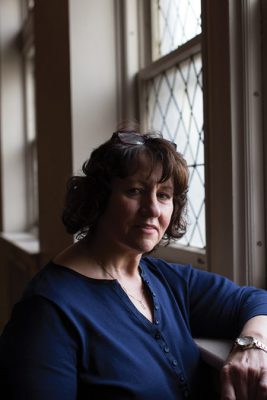
Suzanne Ryan, a divorced Maplewood mother and teacher, attended two Catholic churches close to home in recent years, but found them lacking. “I wanted a more vibrant church that was involved in social justice,” she says of her switch to ANCC four years ago. “I needed to feel that the church did what it was really supposed to do—a message of love and openness. I wanted a community where everything was inclusive and participatory.”
ANCC has had at least one brush with trouble. Leo Donaldson, a former cantor and musician at the Glen Ridge parish, was suspended in 2016 from his church duties after being arrested on sexual-assault charges relating to his roles as a Bloomfield High School teacher and coach.
He pled guilty in 2018 to charges of aggravated sexual assault, sexual assault, endangering the welfare of a child, and official misconduct and was sentenced to seven years in state prison. None of the allegations related to his time at the ANCC church.
Asked to comment, Lucey says, “We have a policy of background checks [for church leaders] and two adults with children at all times, and only in public space. I am grateful we followed our procedure and am keeping Leo in our prayers.”
All ANCC’s priests have other vocations and serve unpaid. Some were ordained in the Roman Catholic tradition; some defected from other churches. Priests can also be ordained under the auspices of the ANCC, a process that includes theology courses through the University of Notre Dame online, and training at a local parish.
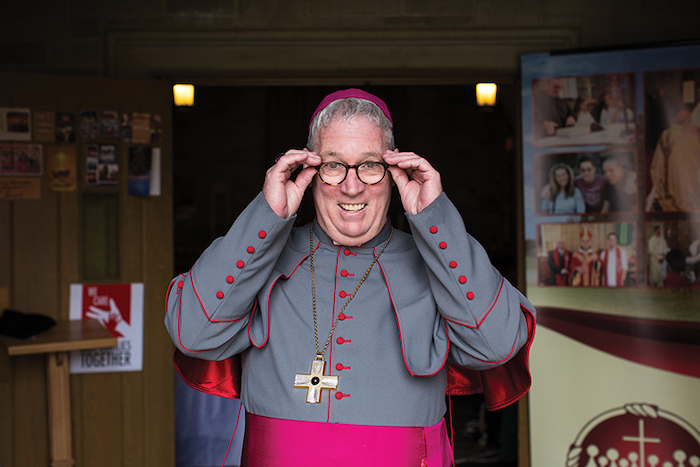
Lucey, 64, took a winding road to the ANCC. A native of the Philadelphia suburb of Conshohocken, Lucey has followed parallel paths of ministry and counseling. He holds an M.S. in education and a PhD. in psychology. He became a Franciscan Friar in 1998. Ordained a Franciscan bishop, he served in ministerial roles in Canada and Mexico. He also worked briefly for the Diocese of Paterson as director of Hope House, a program for HIV and AIDS patients in Dover.
Lucey was ordained as a priest in the Independent Catholic Movement in 2005. Following his ordination, he resigned from the diocese. “It felt like a conflict,” he says. “I couldn’t be working for the Roman Catholic Church and be part of a group that wasn’t Roman Catholic.”
Lucey remained in New Jersey, working as a counselor and psychotherapist and living in West Orange with Bill, his partner of 15 years. At one point, Lucey worked at a hospital in Summit as a counselor and launched a “spirituality unit” there for gay and lesbian patients suffering from physical or chemical abuse.
“I just started asking them what they thought about the Gospel, and they asked me to do it for the entire hospital,” he says. He began holding Sunday Mass, including gay and lesbian weddings. “I started to do more weddings, and people asked where I celebrated Mass.”
Eventually, Lucey began performing eucharistic services in his home on Sunday nights. His next step was to launch his own parish. Inclusiveness was central to his vision.
“As we are committed to acknowledging the Catholic teaching of the dignity of the human person because they are created in the image of God, it follows then that God, who is omniscient and omnipotent, does not make mistakes,” Lucey says. “Then there must be an image of God who is gay, straight, transgender and nonbinary.”
The West Long Branch parish, Our Lady of Guadalupe, took a different road to ANCC affiliation. A former Roman Catholic church with a predominantly Spanish-speaking membership, it faced upheaval in 2009 when the Diocese of Trenton ordered it to consolidate with two nearby churches to form a single parish, Christ the King.
Some Our Lady of Guadalupe members and leaders objected and eventually left the diocese, formed a new parish and joined the ANCC in 2011. Trenton Bishop David M. O’Connell decried the move as illegitimate, stating at the time that “no Catholic Church is independent.”
But theology experts say these new forms of Catholicism are valid expressions of change in religious thinking.
“There is a kind of legitimacy in that these people wanted to be Catholic and are doing Catholic things,” says Dugan McGinley, a teaching instructor in the religion department at Rutgers University. “I think that is legitimately and effectively Catholic, although it is not officially recognized.”
Julie Byrne, author of The Other Catholics: Remaking America’s Largest Religion (Columbia University Press, 2016) and the Hartman Chair in Catholic Studies at Hofstra University, agrees. “There really is no trademark on the word Catholic,” she says. “When [Roman Catholic leaders] say [independents] are not Catholic, they are trying to trademark the Catholic name….To me, if you say you are Catholic, you are Catholic.”
The Rev. Paul Gulya, pastor of the Sacred Heart ANCC Church in Kearny, says his church opens its doors to all “who are feeling left out or broken-hearted and marginalized.”
Gulya, who is gay and married, was ordained in 1981 in the diocese of Bridgeport, Connecticut. In time, he felt distanced from fellow priests because he questioned the church’s rules.
“For me it was an issue of independence,” he remembers. “I found that rectory living wasn’t for me. You were living with people whom you didn’t necessarily share the same ideals or ministerial vision with.”
Mother Phyllis McHugh, a former Roman Catholic nun who spent 10 years with the Sisters of the Roman Family of Nazareth in Philadelphia, was the first woman incardinated as an ANCC priest. She had left Roman Family many years before to teach. She later married and is now a mother and grandmother. McHugh was ordained a priest in 2011 at St. Jude’s Church in Bethlehem, Pennsylvania, the ANCC church in the Philadelphia area. A second woman is set to be ordained this year at the ANCC parish in Bridgeport.
Admitting divorcees is also a founding principle for ANCC. “Why would we withhold the sacrament at a time when people need it the most?” Lucey says. “If they are coming to us, the assumption is that they are in a moral or spiritual dilemma.”
Decisions on day-to-day matters are left to the local parishes, Lucey says. However, each parish must celebrate Mass with the liturgy of Vatican II and perform the same seven sacraments as the Roman Catholic Church.
“The Catholic Church,” Lucey declares, “is the church that came from the blood and water that flowed from the side of Christ and [was] proclaimed publicly at Pentecost.”
Complete Article ↪HERE↩!

